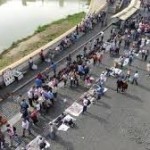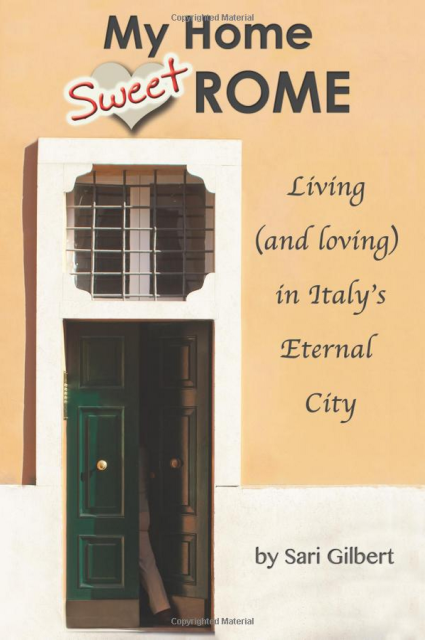Illegal peddlers; unchecked they are a blight on the Eternal CIty.
As Rome gears up for the hordes of pilgrims and tourists who have arrived here for both the Easter holiday and then the double canonization on April 27 of former popes John XXIII and John Paul II, there was more to deal with than just simple logistics. The city’s illegal thousands of illegal peddlers all seemed to be heading towards St. Peter’s to entice visitors with their wares and, in the process, to make this city dirtier and more chaotic than it normally is.
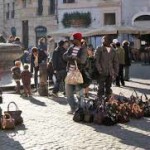 The merchants association of Rome (Confcommercio) recently published a scathing document taking the city government to task for failing to do anything to check the advance of the army of illegal peddlers who are, after all, taking business away from legitimate stores, evading taxes and distracting attention from Rome’s marvelous monuments and medieval buildings. I couldn’t agree more and think it is shameful that Rome’s new mayor (like his predecessors) is doing next to nothing about it.
The merchants association of Rome (Confcommercio) recently published a scathing document taking the city government to task for failing to do anything to check the advance of the army of illegal peddlers who are, after all, taking business away from legitimate stores, evading taxes and distracting attention from Rome’s marvelous monuments and medieval buildings. I couldn’t agree more and think it is shameful that Rome’s new mayor (like his predecessors) is doing next to nothing about it.
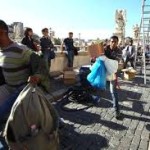 I don’t know if Confcommercio is correct when it numbers the peddlers – some Italians but these days mostly Asians, Africans and Eastern Europeans – as between 15,000 and 18,000. That would seem rather exaggerated to me. But there sure are a lot of them. The Asians, mostly scores of Bangladeshi, appear on the streets (sometimes you encounter one every ten steps or so) to sell cheap umbrellas that must be stores in warehouses throughout the city by the people who exploit them) or else set up tables, often only a few feet away from one another, selling imported silk scarves that they roll up like small turbans.
I don’t know if Confcommercio is correct when it numbers the peddlers – some Italians but these days mostly Asians, Africans and Eastern Europeans – as between 15,000 and 18,000. That would seem rather exaggerated to me. But there sure are a lot of them. The Asians, mostly scores of Bangladeshi, appear on the streets (sometimes you encounter one every ten steps or so) to sell cheap umbrellas that must be stores in warehouses throughout the city by the people who exploit them) or else set up tables, often only a few feet away from one another, selling imported silk scarves that they roll up like small turbans.
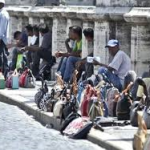 The Africans, primarily Senegalese, sell counterfeit bags – Vuitton, Fendi, Chanel etc. Nigerians wander around selling socks and counterfeit CDs. Others sell sunglasses, cheap jewelry, gadgets of various sorts and still others pretend to be “street artists” since one city law was/is (it’s not clear) more tolerant of those who are truly artisans.
The Africans, primarily Senegalese, sell counterfeit bags – Vuitton, Fendi, Chanel etc. Nigerians wander around selling socks and counterfeit CDs. Others sell sunglasses, cheap jewelry, gadgets of various sorts and still others pretend to be “street artists” since one city law was/is (it’s not clear) more tolerant of those who are truly artisans.
But whoever these people are, the fact is that they are selling goods without paying any taxes on their earnings – income or VAT -or giving receipts to customers. They are setting up tables, chairs and lights for nighttime selling on public soil without paying the fees to the city that any restaurant or café does to put chairs and tables out on the sidewalk. And they are making money without incurring any of the costs borne by legitimate shopkeepers – taxes, rent, utilities, personnel. It is, by any standard, unfair competition. But in addition, the widespread illegality clogs up sidewalks and, even more importantly, mars the view.
Rome, glorified in the recent Italian Oscar-winning film. The Great Beauty, is one of the most beautiful cities in the world. But with sidewalks covered with sheets bearing counterfeit goods, unlicensed pushcarts and snack trucks parked in the places favored by tourists, it is sometimes hard to tell.
According to Confcommercio, the turnover of this kind of illegal commerce in Rome alone amounts to around 1.5 billion (sic!) Euros a year. If the illegal peddlers, in Italian referred to as abusivi, were to pay taxes and other charges, the city coffers would definitely be fuller than they are. But would it be worth it? I don’t think so. I came to Rome to bask in the remains of its glorious past. And if I want to shop, there are wonderful Italian products to buy rather than the CRAP these peddlers are plying.
So why have a succession of city governments allowed this to happen? Some people may imagine that it’s all the fault of a corrupt city police but I don’t buy that. Another possibility – and it is certainly a contributing factor – is that the Rome city police force is seriously understaffed. But it is much worse. This is Rome where law enforcement officers and local politicians are just too lackadaisical, laid back and lazy to really care.
